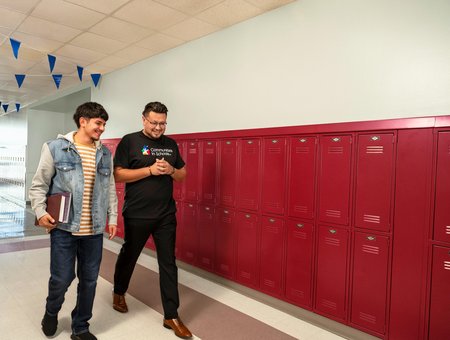There’s an urgent need for “wraparound services” to support low-income students in Pennsylvania
This op-ed was published on Nov. 13, 2023, in the Penn Live Patriot News.
Not all students have an equal chance to succeed. The socioeconomic achievement gap is a real phenomenon in which lower-income children are significantly less likely to succeed than their wealthier classmates. Poverty affects children’s brain development, causing challenges in paying attention and retaining information. Low-income students also attend schools with insufficient funding and resources, such as quality teachers.
The need for comprehensive wraparound services and intentional community collaboration cannot be overstated in these schools. These services address the complex challenges that students in underserved communities face and provide them with the tools and resources they need to thrive. Embracing wraparound services is not just an option; it is imperative if we are committed to bridging the educational divide and ensuring every child has an opportunity for success.
You may think this is sad, but it certainly isn’t relevant in your community. Right? You might be shocked to know that nearly 65% of schools in Cumberland County are Title I-eligible, meaning that 40% or more of the students in those schools are living in poverty.
In Dauphin County, 80% of schools are Title I eligible.
In low-income neighborhoods, students often grapple with many barriers that extend far beyond the classroom. These barriers include homelessness or transiency, food insecurity, limited access to healthcare, and exposure to violence. These challenges create a perfect storm that hinders academic performance, attendance, mental health, and overall well-being. The consequences are dire, with these schools frequently witnessing higher dropout rates and lower academic achievement scores.
Suppose we continue to turn a blind eye to these issues. In that case, we perpetuate a cycle of poverty and limited economic opportunities that cripples not only these individuals but our society.
Wraparound services offer a holistic approach to addressing these challenges by recognizing that a child’s success is intrinsically linked to their overall well-being.
These services encompass a range of supports, including mental health counseling, after-school programs, access to nutritious meals, and even housing assistance. By addressing students’ basic needs, we create a more stable foundation for learning, allowing them to focus on their education and aspirations.
Furthermore, wraparound services also extend a helping hand to parents and caregivers, empowering them to support their children’s educational journey and break the cycle of disadvantage.
Community collaboration is equally essential. Schools alone cannot solve the complex, wicked challenges faced by students in impoverished communities. Collaborative partnerships with local organizations, businesses, and community leaders can provide an extensive network of support that complements the efforts of educators.
By working together, we can ensure that students have access to a wide array of resources, supports, and out-of-school activities that broaden their horizons and help them achieve their full potential.
It’s worth noting that wraparound services and community collaboration are not just about fixing an existing problem; these interventions prevent problems before they start. By taking an upstream approach, schools can create a nurturing and inclusive environment that minimizes disruptions to the learning process. This proactive approach benefits individual students and enhances the overall classroom experience, making it easier for teachers to focus on instruction and academic achievement.
Critics often argue that implementing wraparound services and fostering community collaboration comes with a financial burden. And indeed, it does. However, viewing this as an investment in our future is essential. The cost of not addressing these challenges is greater, resulting in lost potential, increased crime rates, and a heavier reliance on social services. Investing in wraparound services and community collaboration is a way to break the cycle of poverty and build a more prosperous society. When students succeed, we all succeed.
Locally, Communities In Schools of Pennsylvania is a leading nonprofit organization that partners with school districts to implement these holistic supports in struggling schools. Currently partnering with 27 schools across the region, CISPA uses an evidence-based, federated model of services to surround students with a support community, empowering them to stay in school and achieve in life.
We cannot afford to underestimate the power of wraparound services and community collaboration in our schools, particularly those in low-income communities. Education is not just about imparting knowledge; it is about empowering students to lead fulfilling lives and contribute to the well-being of our society. By embracing these innovative approaches, we can provide every child – regardless of their socioeconomic status or zip code – an equal shot at success.
Only then will education be the great equalizer when our approach to education is collaborative and holistic.
Jessica Knapp, DPA, is President & State Director of Communities In Schools of Pennsylvania, which brings community resources directly into schools by embedding locally hired and trained coordinators focused on student success.



